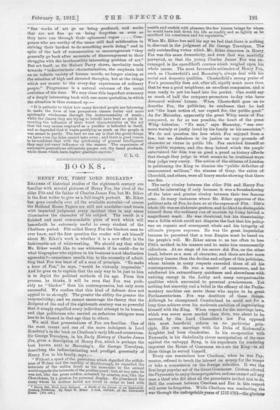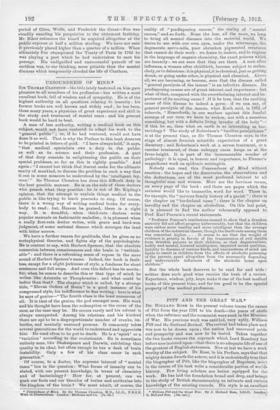BOOKS.
HENRY FOX, FIRST LORD HOLLAND.* READERS of historical studies of the eighteenth century are familiar with several pictures of Henry Fox, the rival of the elder Pitt and the father of Charles James Fox, but Mr. Riker is the first writer to give us a full-length portrait. Mr. Riker has gone carefully over all the available material—of course the Holland House Papers are still not available—and treats with impartial judgment every incident that in any sense illuminates the character of his subject. The result is a finished and most commendable piece of work which will
henceforth be extremely useful to every student of the Chatham period. Pitt called Henry Fox the blackest man he ever knew, and the first question the reader will ask himself about Mr. Riker's work is whether it is a new effort in the fashionable art of whitewashing. We should say that while Mr. Riker would like to use whitewash if he could—for to what biographer who rejoices in his business is not idealization
agreeable P—conscience recalls him to the necessity of admit- ting that Fox was least of all a man of principle. "To make a hero of Fox," he says, " would be virtually impossible." And he goes on to explain that the only way to be just to him
is to depict the political methods of his age. From this process, he thinks, it will be seen that Fox was prob- ably no "blacker" than his contemporaries, but only more successful. We confess that this kind of defence does not appeal to us strongly. The greater the ability the greater the responsibility; and we cannot encourage the theory that the Zeitgeist of the end of the eighteenth century was so powerful that it simply engulfed every individual attempt to be honest, and that politicians who carried on nefarious intrigues were less to be blamed in that age than in others.
We said that presentations of Fox are familiar. One of the most recent and one of the more indulgent is Lord Rosebery's in the book on Chatham's early life and connexions. Sir George Trevelyan, in his Eaely History of Charles James Fox, gives a description of Henry Fox, which is perhaps the
best known next to Macaulay's. Sir George Trevelyan, describing the indiscriminating and prodigal generosity of Henry Fox to his family, says:- " Without a spark of the patriotism which dignified the selfish- ness of Wolsey and the cupidity of Marlborough, ho regarded the Snteresta of the nation much as his namesake in the animal world regards the interests of the poultry-yard ; but, at any rate, he was not, like the great soldier, actuated by avarice, nor, like the Churchman, by a passion for personal display. He plundered the many whom he neither hated nor loved in order to load with • Ham Fos, Post Lord Holland. A Study of the Caroor of en Bisktevoth• Century rotilicion. By Thad W. Wear. 2 vols.. Oxford: at the University Press. [21s. not.]
wealth and surfeit with pleasure the few human beings for whom ho would have laid down his life as readily and as lightly as he sacrificed his conscience and his reputation."
When Mr. Riker has said his say we feel that there is nothing to discount in the judgment of Sir George Trevelyan. The. only outstanding virtue which Mr. Riker discovers in Henry. Fox was this same domesticity, and even that was morbidly perverted, so that the young Charles James Fox was en, °enraged in the spendthrift courses which weighed upon his whole career. The most favourable estimates of Henry Fox, such as Chesterfield's and Macaulay's, always deal with his social and domestic qualities. Chesterfield's strong praise of Fox's personality does not, after all, signify much more than that he was a good neighbour, an excellent companion, and a man ready to put his hand into his pocket. One could say as much of half the company-promoters to-day who have devoured widows' houses. When Chesterfield goes on to describe Fox, the politician, he confesses that he had not "the least notion of, nor regard for, the public good." As for. Macaulay, apparently the great Whig name of Fox conquered, so far as was possible, the heart of the great Whig abistorian. "No man," says Macaulay, "was ever more warmly or justly loved by his family or his associates." We do not question the love which Fox enjoyed from a few, but we disbelieve in its justice on any grounds of character or virtue in public life. Fox enriched himself at. the public expense, and the deep hatred which the people' entertained for him was as good a proof as history affords that though they judge in what seems to be irrational waya they judge very surely. The action of the citizens of London in petitioning the King to dismiss the "public defaulter of unaccounted millions," the stanzas of Gray, the satire of Churchill, and others, were all heavy smoke showing that there was fire.
The early rivalry between the elder Pitt and Henry Fox! would be interesting if only because it was a foreshadowing of the later and greater rivalry between their two famous. sons. In many instances where Mr. Riker approves of the political acts of Fox, he does so at the expense of Pitt. Pitt's, whole life was an elaborate gesture, and he liked to distinguish, himself from the ordinary run of mortals by living behind a magnificent mask. He was theatrical, but his theatricality was a foible which could not disguise the fact that his policy was an organic and consequent whole and his integrity of ultimate purpose supreme. He was the great Imperialist because lie perceived that a true Empire must be based on the people's will, Mr. Riker seems to us too often to lose Pitt's method in his manner and to make him unnecessarily ridiculous. At no stage of his career did Fox, on the other hand, behave as a man of character, and there are few more salutary lessons than the decline and eclipse of this politician,. whose talents in many respects exceeded those of all his contemporaries. He was a master, of manoeuvre, and he reinforced his extraordinary quickness and shrewdness with untiring energy in the Lobby and many companionable qualities which amounted to personal graciousness. Yet nothing but sincerity and a belief in the efficacy of the Parlia- mentary machine can serve those who aspire to be great Parliamentarians. Fox was destitute of these things. Although he championed Cumberland be could not for a long time achieve even his moderate ambition of ingratiating! himself with the King. When respect for the marriage laws, which was never more needed than then, was about to be secured by the Lord Chancellor's law Fox opposed:
this most beneficial reform on no particular prin. ciple. His own marriage with the Duke of Richmond's: daughter had been clandestine. In his co-operation with.
Newcastle, in his diabolically clever manipulation of the ease against the unhappy Byng, in his expedients for rendering impotent the House of Commons roil-4-via the King—in all these things he served himself.
Every one remembers how Chatham, when he was Pay. master, refused to touch the interest on money for the troops
or take a commission on the foreign subsidies. It was the first large popular act of the Great Commoner. Custom allowed
the Paymaster to enjoy these perquisites, and one cannot ca 11 any
man a thief who did what all the precedents invited him to de. Still the contrast between Chatham and Fox in this respect will never be forgotten. While Chatham was conducting the war through the unforgetable years of 1757-1761—the glorioup
period of Clive, Wolfe, and Frederick the Great—Fox was steadily exacting his perquisites to the uttermost farthing. Mr. Riker estimates the hoard he acquired altogether at the public expense at half a million sterling. We have not seen it previously placed higher than a quarter of a million. When ultimately Fox championed the Treaty of Paris in 1762 he was playing a part which he had undertaken to earn his peerage. His undignified and unsuccessful pursuit of an earldom was, to our thinking, more pitiable than the mental dimness which temporarily clouded the life of Chatham.











































 Previous page
Previous page